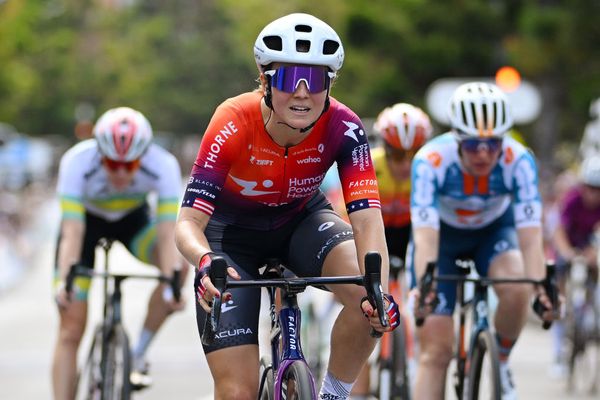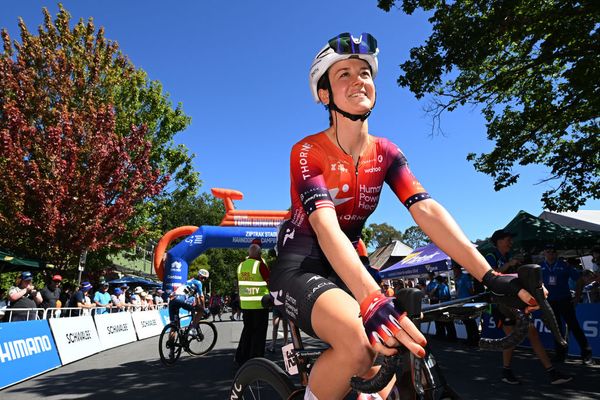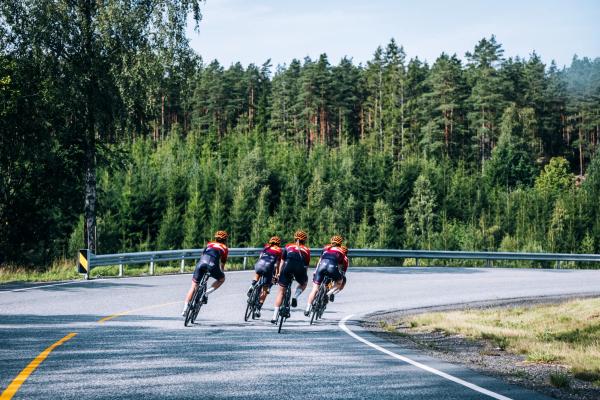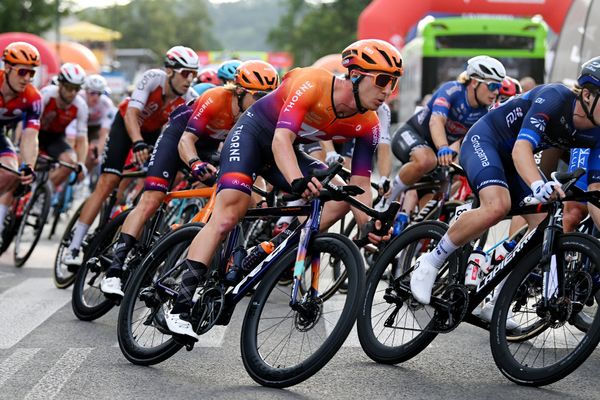Climbing the ladder: How Human Powered Health are elevating their women’s team
General manager Ro De Jonckere on helping her squad to rise with the tide of women’s cycling
Matilda Price
Racing News Editor
© Getty Images
Lily Williams, Audrey Cordon-Ragot and Ruth Edwards plot the masterplan at the women's Santos Tour Down Under
This story is part of our series celebrating International Women’s Day on 8 March, and exploring how the theme of ‘Inspire Inclusion’ can fit into women’s cycling, racing, tech and more.
Human Powered Health are a team on a journey. Starting out life as a small American UCI outfit in 2013, they have risen through the ranks, through their days as Rally, before joining the Women’s WorldTour as Human Powered Health. They’ve been at that level for two years now, and for 2024 the focus is to elevate their team even further.
It’s no insult to say that, for the past two seasons, Human Powered Health were hovering around the lower end of the WorldTour rankings, and that’s what they want to change in seasons to come. Bar just signing all the best riders, how do you do that?
According to general manager Ro De Jonckere, their approach is about building a structure that works, and knowing that that will usher in good results.
A change in circumstance meant the team had more ability to do this in 2024, but De Jonckere explained how it was something the team needed to do anyway in the current climate of the women’s peloton.
“When the decision was taken to go full-out for a women’s team, obviously that meant that we had a bit more resource that we could put into the women’s team,” De Jonckere told GCN in a recent call, referencing the closure of the men’s outfit at the of 2023.
Read more: Human Powered Health men’s team set to fold
“But on the other hand, we knew that it was very necessary, because you can see in the last few years that the level and professionalism of women’s cycling has really been on the rise, which is a great thing.
“I come from a long background in men’s WorldTour racing and things that have been very normal in men’s cycling – nutritionists or professional coaches, for example, that’s something that 15 years ago was already common in men’s cycling, but this is all now just starting to come in women’s cycling.
"I think it’s great to see that evolution, and that it’s also getting way more professional in women’s cycling, but it means that you have to follow that trend otherwise you’re missing the train.”
What that evolution looks like for Human Powered Health is some pretty big changes to their team over the off-season. They signed nine new riders after letting go of the same number, they hired Giorgia Bronzini as a sports director, they landed a new bike sponsor in Factor, they brought in a nutritionist and a mental coach, and they’ve shaped rider resources around sprinting and names who can win.
Read more: Ruth Edwards to return to the WorldTour with move to Human Powered Health
Money, of course, comes into it – that’s how a team like Human Powered Health can afford to bring in all these additional elements – but for De Jonckere, it’s about spending her budget in ways that will work in the long term, rather than trying to trade cash for quick success.
“You cannot buy a good team; you have to build a team,” she said. “It just doesn’t work like that, to say ‘tomorrow we’re offering a million for Lotte Kopecky, tomorrow we have the best team in the world’.
"All of the pieces of the puzzle need to fit, so it’s very important that first you have your structure right, you have the right support, and then you can start to build your performance. I think that’s the right way to do it, and that’s the most durable way to do it.
"I’m happy that in this team, we have the support and the belief from our ownership that this is the right way to do it, so it’s pretty great to be able to do it that way.”
More similarities than differences with men’s cycling
One of the notable things about De Jonckere is that, as well as women’s cycling, she’s someone who knows a lot about running a men’s team too. Her focus is solely on women’s sport at the moment, but her experiences all play into the way she manages Human Powered Health.
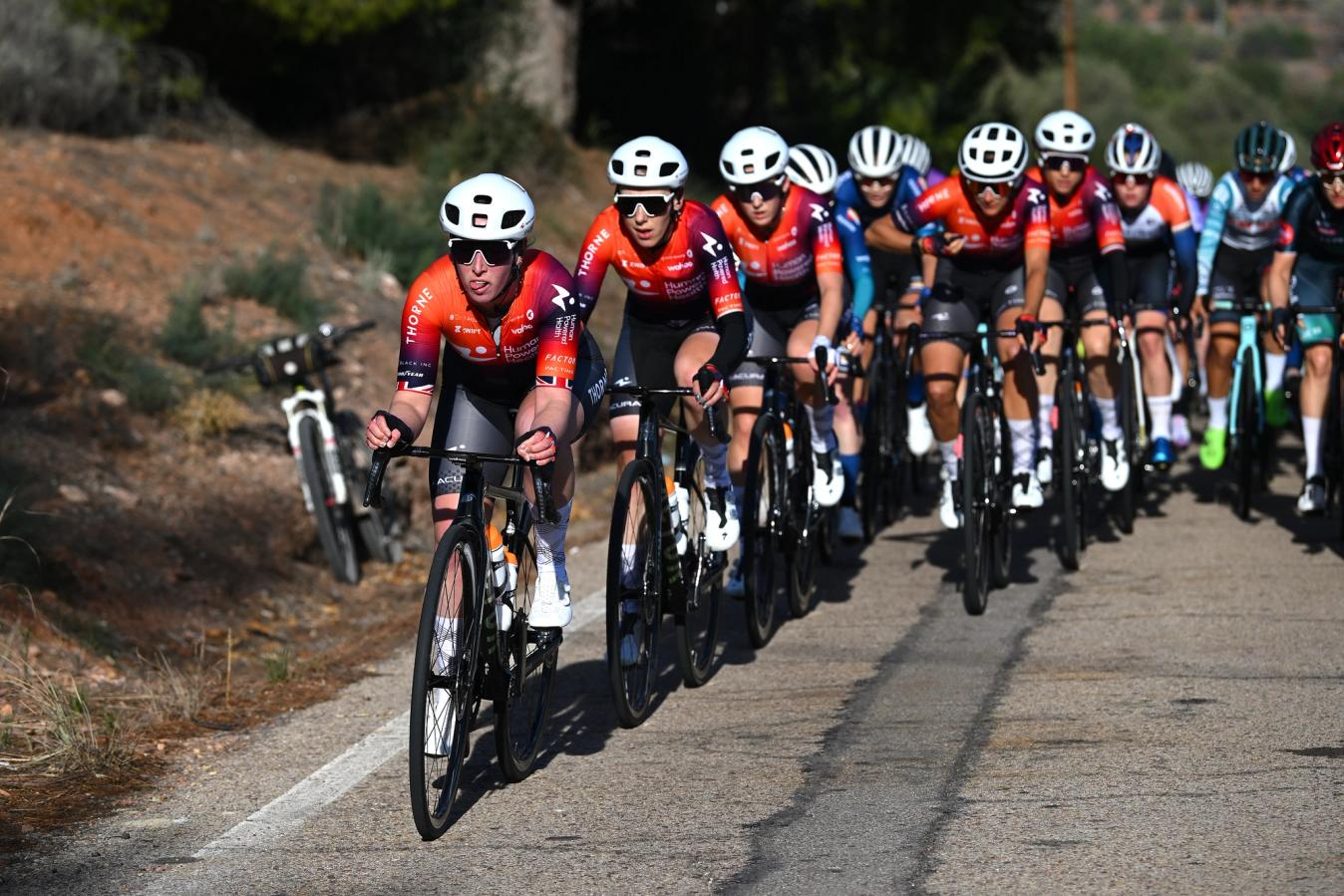
© Getty Images
Alice Wood leads her teammates out at VCV Feminas Gran Premio Tuawa 2024
Over the years, a lot of emphasis has been placed on the differences between men’s and women’s cycling, and how forcing the women’s peloton into the mould of men’s racing may not be beneficial.
“I think it’s mainly in very little things, but all in all there are a lot of similarities – honestly, I see more similarities than differences,” she said.
“Especially now that the level is going up, because if you had asked me two years ago, I would have said it’s completely different, because the level of professionalism was so different, but we’re really going through an evolution now.”
There are, of course, immutable differences between the two sides of the sport, but attitudes are converging, and De Jonckere sees this as a good thing.
“It is something that you could say might be a little more delicate with women when we’re talking about fitness level and nutrition and diets,” she said. “But you feel that the women are now evolving with us at this level, they look at it the same as men are looking at it with good nutrition, body weight, things like that.
"I think for many of these women, they see it as a great opportunity now that they finally have the same resources as the men, the same responsibilities, and that they are being treated equally, as much as we can within the limits of the difference in budgets, because that’s still a little bit the case.”
Read more: €1 million offers ‘not good for long term sustainability’ of women’s cycling, says FDJ-SUEZ boss
There comes the sticking point: budgets. They vary wildly in cycling – that disparity is not something that’s unique to the women’s sport – and that can cause problems. Human Powered Health are a team that are trying to sit comfortably within the hierarchy, rather than scramble for survival at the bottom, but the difficulty is something they’re well aware of.
“One of the downsides, I would say, of the very rapid growth of women’s cycling is that maybe sometimes it goes a little bit too fast. Because obviously with that raised level of professionalism comes higher costs, and we see that not all teams are ready for that, because maybe the budgets aren’t growing as fast as costs are growing," De Jonckere said.
"That’s both on the level of the teams and on the level of the race organisers, because we have a calendar that is on one hand great – you have so many opportunities to race both on WorldTour level and .1, .2 races – but on the other hand, you also see that some organisers are struggling. So it is a little bit of a delicate balance.
“So that is something that we will need to be very careful about, and that hopefully can be managed in a good way and not have too many victims along the way.”
What does success look like?
Having a good ethos and working on your structure is one thing, but in a sponsorship-dependant sport, there has to be a way of quantifying whether you are successful. For a team like Human Powered Health, that comes in the form of goals that are modest but clear.
“For us, the position that we end up in the ranking is going to be important. This year, I would say if we can get to the 10th or 11th spot then I think we can be happy with ourselves and it means we’re continuing to grow. We came from 22nd to 14th last year, but we can go up to 10th or 11th this year, and then move into the top 10 next year, and to be able to do that we will need to be able to score consistently through the season.
“For that, we have a calendar with a good mix of WorldTour races and .1 races. We are not doing the full WorldTour calendar – there are a few that we won’t do – but we are doing most of it, and we’ll add to that some .1 races. That’s a good combination because you can put your more experienced riders in the WorldTour races and then use the .1 races for the young girls to get some more experience and maybe get a result and keep it motivating for everybody."
Read more: Ruth Edwards rediscovers race rhythm at Santos Tour Down Under
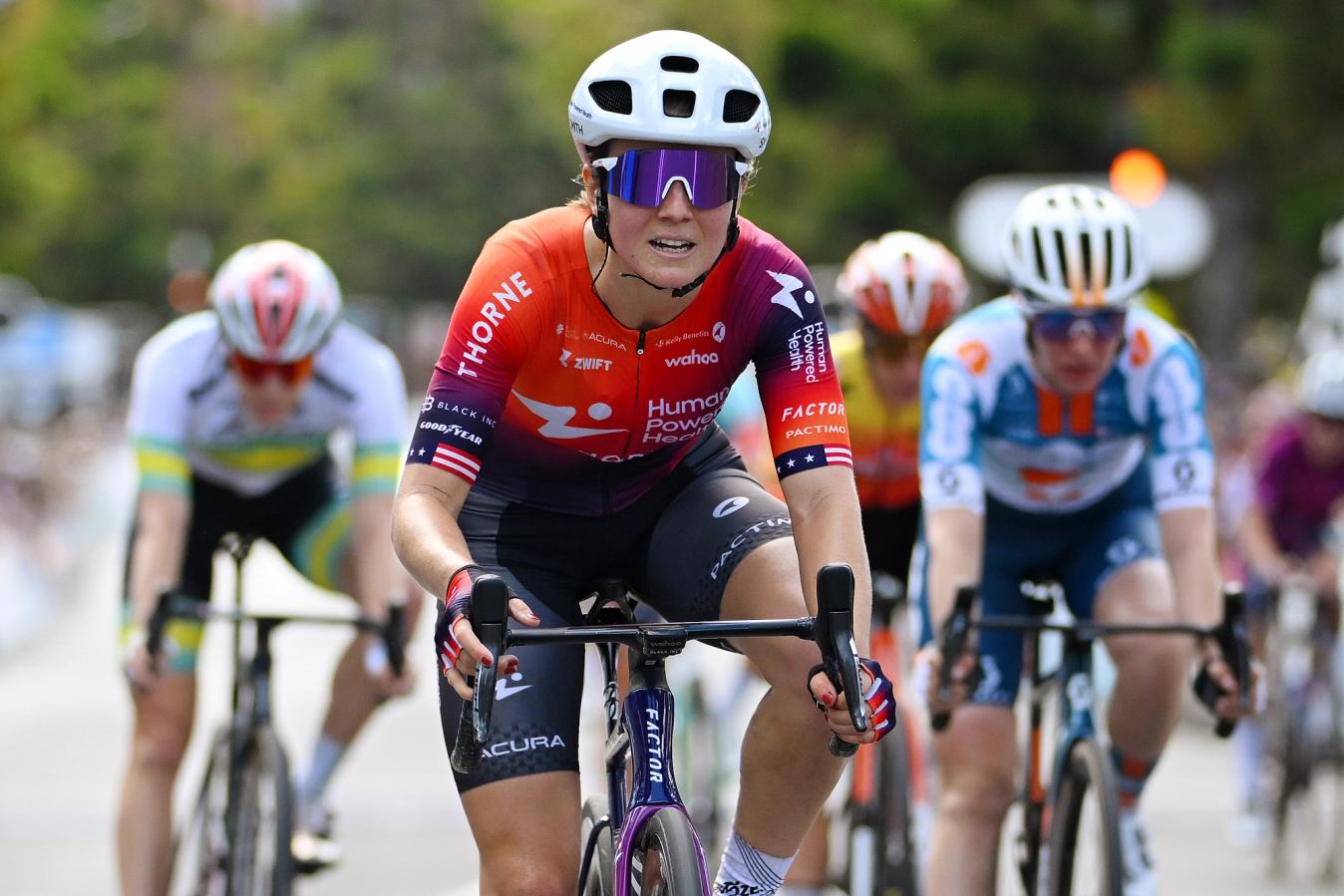
© Getty Images
Ruth Edwards is perhaps the most high-profile signing for Human Powered Health, with the American coming out of retirement to ride in the team's distinctive orange
With this aim, the team’s recruitment has focused more on the slightly more experienced riders, with De Jonckere also highlighting the way the pyramid and the tiered structure need to grow, so young riders have a place to develop. With UCI points so important, the situation is that – perhaps counterintuitively – it’s mainly the bigger teams who can give a spot to younger riders.
“The reason is that, for us, at this point it’s very important, like I said, to grow. We want to go up the rankings, and to do that you need points, and to get points it’s just easier for us to rely on a little bit more experience.
"For teams like Lidl-Trek, for example, who have some of the top riders who can grab the big points, I would say they are able to have some young girls alongside that that they can develop because if they don’t score a lot of points in the first few years, that’s okay, they’re getting the points anyway with their top riders.
"For a team like us, we’re still very much growing and building our performance, so it’s a bit more difficult at this point to say ‘we’ll take five very young riders and see how it goes’.”
A woman-powered team
As well as improving their structure and putting an emphasis on professionalism, there is another string to Human Powered Health’s bow: they are a team that have a lot of women working behind the scenes, alongside De Jonckere as one of a growing number of female general managers in the women’s sport.
Having women working behind the scenes is not something the team – or any team, for that matter – makes a big deal about, but that doesn’t mean it’s an insignificant fact.
“I think it’s very important, and that’s why we try to have women in all levels of our team,” De Jonckere said. “We have female soigneurs, our nutritionist is female, we have a female sports director, our sports psychologist is female.
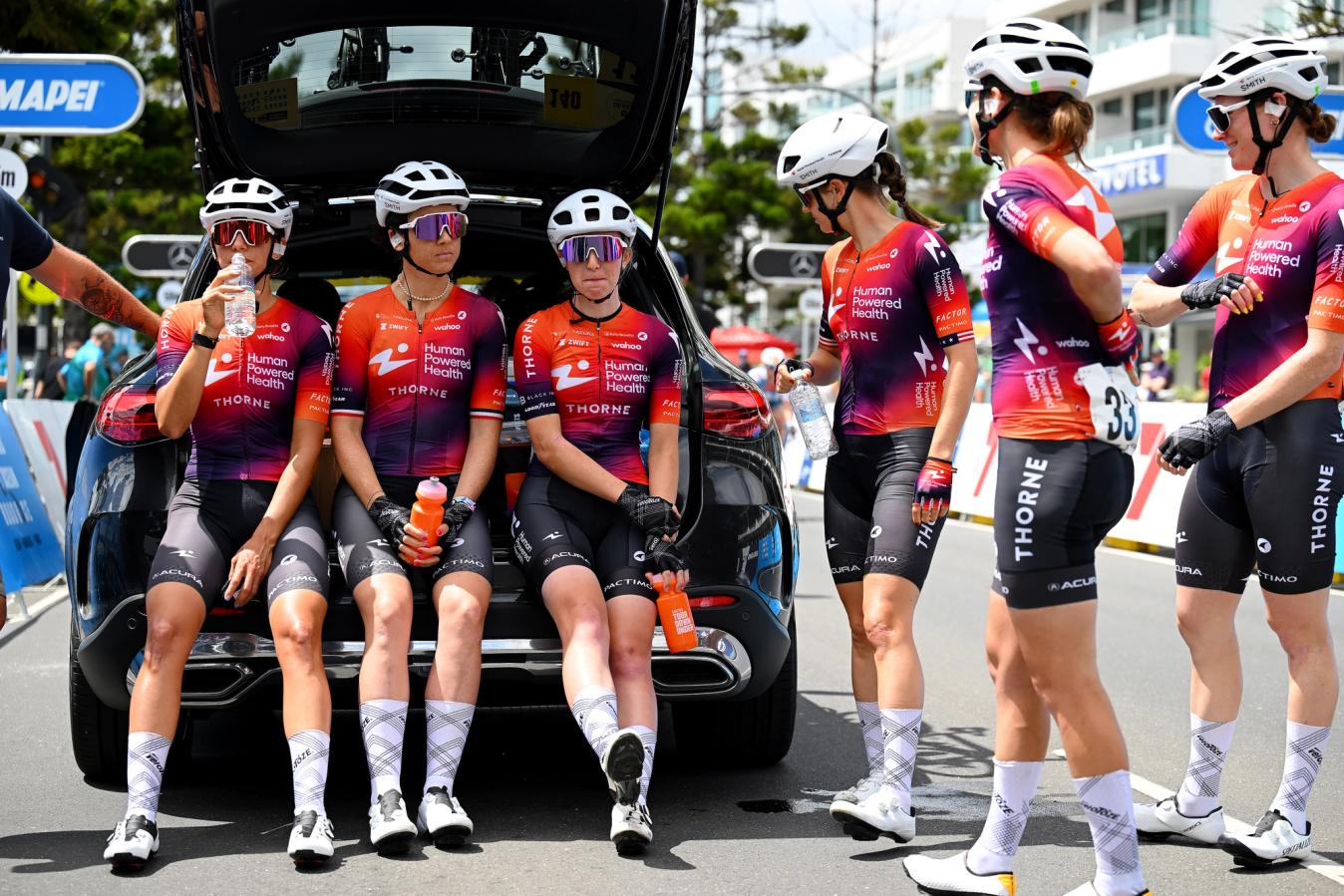
© Getty Images
Both on and off the bike, Human Powered Health have a team to be proud of
“I don’t want to have a team where we have only females in the staff, but I think it’s good to have a mix. Maybe it’s not as common to have women in leadership roles, but we see that that is happening more and more and I think that’s been a good evolution. Especially when it comes to women’s cycling, it has been a world that has been dominated by men for many years."
Read more: Sky's the limit: Ruth Edwards on burn-out and her passion for racing
“In my career I have experienced sometimes some difficulties as a woman in a man’s world, so to say," De Jonckere continued. "Although in general, from my close environment, I’ve always felt very supported, and it was great that I was given this opportunity and the faith and belief from the Human Powered Health ownership for this role.”
That belief is clearly well-placed, as De Jonckere is setting up a strategic, ambitious squad that doesn’t just want to rise with the tide in women’s cycling, but they want to ride the wave too. The structure is there for 2024, now the results just need to follow.
.jpg%3Frect%3D0%2C3%2C5967%2C3972%26w%3D1280%26h%3D852%26auto%3Dformat&w=3840&q=90)










.jpeg?w=600&auto=format)
